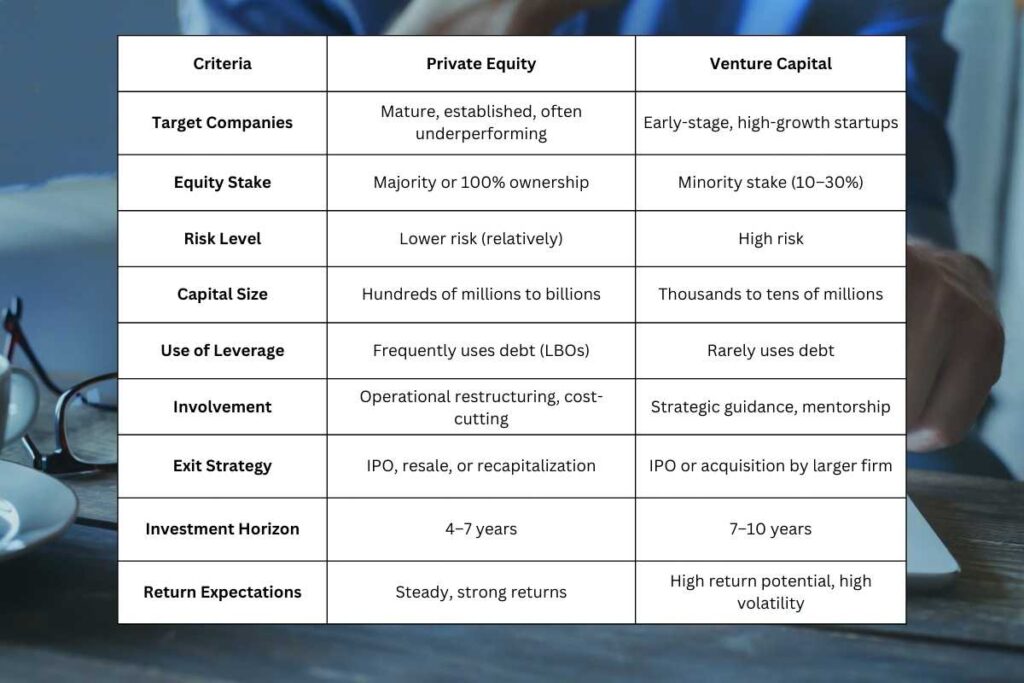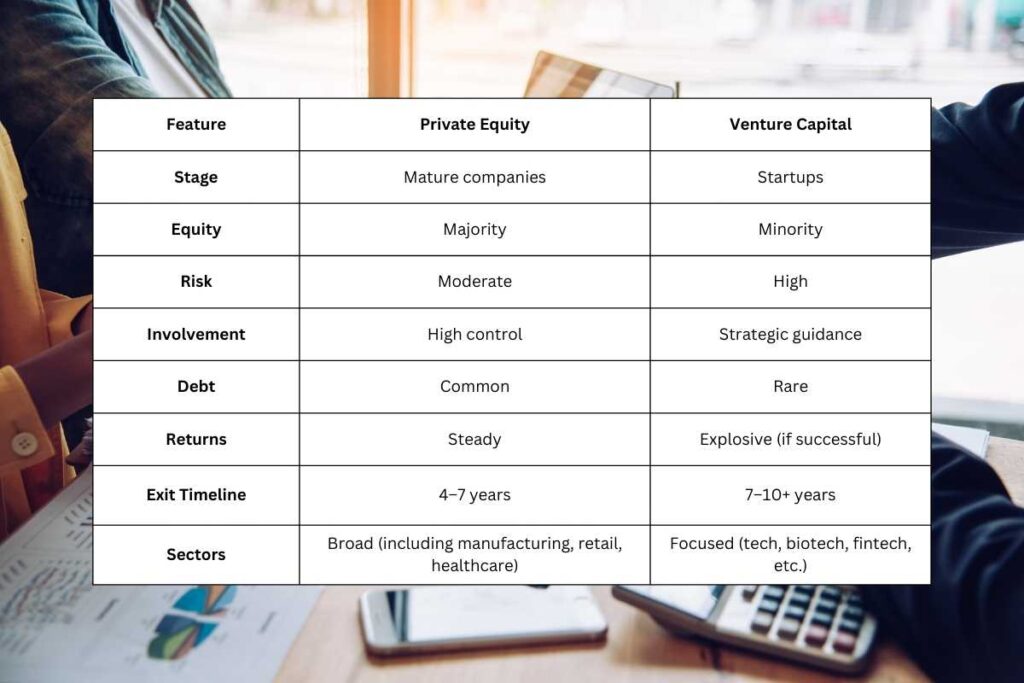Two Roads to Business Growth
In the fast-moving world of finance, Private Equity vs Venture Capital are often used interchangeably, but in reality, they represent two distinct strategies, investment philosophies, and stages of business development. Both involve investing in private companies and can generate substantial returns, yet they differ dramatically in approach, risk tolerance, target companies, and outcomes.
For entrepreneurs, investors, and financial professionals alike, understanding the differences between private equity and venture capital isn’t just academic; it’s strategic. Whether you’re seeking funding, evaluating career paths, or simply want to make sense of how the big money moves in the business world, this guide will help you decode the DNA of private equity and venture capital.
1. What is Private Equity?
Private Equity refers to investment funds that buy and restructure mature, often underperforming companies that are not publicly traded. PE firms typically take a controlling interest, often 100% ownership, in these businesses, with the intent of improving performance and selling them later at a profit.
Key Characteristics of Private Equity:
- Invests in established companies
- Buys the majority or full control
- Focus on operational improvements and efficiency
- Often uses leverage (debt) for acquisitions (aka Leveraged Buyouts or LBOs)
- Aims for high returns over a 4–7 year horizon
Examples of Private Equity Firms:
2. What is Venture Capital?
Venture Capital focuses on investing in early-stage, high-growth startups that have significant upside potential but also a high risk of failure. VC firms usually take a minority stake in companies and provide more than just capital; they often contribute mentorship, strategic advice, and connections.
Key Characteristics of Venture Capital:
- Invests in startups and young companies
- Takes minority equity stakes
- High-risk, high-reward focus
- Often involves multiple rounds (Seed, Series A, B, C…)
- Emphasis on product-market fit and scalability
Examples of Venture Capital Firms:
- Sequoia Capital
- Andreessen Horowitz
- Accel
- Bessemer Venture Partners
3. Key Differences Between Private Equity and Venture Capital
Let’s break down the differences side-by-side:

| Criteria | Private Equity | Venture Capital |
| Target Companies | Mature, established, often underperforming | Early-stage, high-growth startups |
| Equity Stake | Majority or 100% ownership | Minority stake (10–30%) |
| Risk Level | Lower risk (relatively) | High risk |
| Capital Size | Hundreds of millions to billions | Thousands to tens of millions |
| Use of Leverage | Frequently uses debt (LBOs) | Rarely uses debt |
| Involvement | Operational restructuring, cost-cutting | Strategic guidance, mentorship |
| Exit Strategy | IPO, resale, or recapitalization | IPO or acquisition by larger firm |
| Investment Horizon | 4–7 years | 7–10 years |
| Return Expectations | Steady, strong returns | High return potential, high volatility |
4. Stages of Business They Fund
Understanding the lifecycle of a business helps to illustrate where private equity and venture capital typically operate:
Venture Capital:
- Seed Stage: Product development, market research
- Series A: Establishing product-market fit
- Series B & C: Expanding operations, scaling
- Series D+ or Pre-IPO: Preparing for public offering or acquisition
Private Equity:
- Growth or Late Stage: Revenue-generating, cash-flow positive businesses
- Mature Stage: Firms with predictable income, sometimes stagnating
- Distressed Stage: Underperforming or undervalued companies for turnaround
5. The Role of Debt and Control
This is one of the starkest differences between the two investment approaches.
Private Equity: Leverage and Control
PE firms often use debt to finance acquisitions. This is known as a leveraged buyout (LBO), where a firm uses a small amount of equity and a large amount of debt to purchase a company. The acquired company’s assets and future earnings are used as collateral.
This approach allows PE firms to maximize returns, but it also means taking on significant control over the business, often replacing management and implementing aggressive cost-cutting strategies.
Venture Capital: Equity and Support
VC firms typically avoid debt. Instead, they inject pure equity capital into startups, hoping their value will increase over time. Because startups are inherently risky, VC investors expect a few “unicorns” (startups valued at over $1 billion) to compensate for many failures.
They don’t usually control the company but influence through board seats, advice, and strategic guidance.
6. Exit Strategies and Returns
Private Equity Exits:
- Selling to another PE firm
- Taking the company public (IPO)
- Selling to a strategic buyer (M&A)
- Dividend recapitalization (refinancing to take cash out)
PE returns are driven by increasing the company’s value, often through cost efficiencies, growth, or market consolidation. The goal is steady, predictable returns.
Venture Capital Exits:
- Initial Public Offering (IPO)
- Acquisition by a larger company
- Secondary share sales in later funding rounds
VC returns rely heavily on high-growth potential and finding the next big thing. Even one successful exit can offset multiple failed investments.
7. What Entrepreneurs Need to Know

If you’re a business owner or startup founder, choosing between private equity and venture capital depends on your stage, vision, and control preferences.
Choose Venture Capital If You:
- Have a high-potential startup
- They are in an early stage of development
- Want mentorship and ecosystem support
- Are willing to trade equity for growth
- Can accept high investor involvement
Choose Private Equity If You:
- Have a mature, revenue-generating business
- Want liquidity or help with succession planning
- Need operational improvements or expansion capital
- Are open to selling majority or full control
- Can manage debt or efficiency mandates
8. Career Perspectives: Working in Private Equity vs Venture Capital
From a career standpoint, both fields are prestigious, competitive, and financially rewarding. But the day-to-day roles differ:
Venture Capital Careers:
- Focus on market trends and innovation
- Work with founders, often in tech or biotech
- Evaluate product viability and team potential
- Collaborative, fast-paced, entrepreneurial vibe
Private Equity Careers:
- Focus on financial modeling and due diligence
- Work on buyouts, turnarounds, and operations
- Emphasis on EBITDA, cash flow, and deal structuring
- Analytical, data-heavy, and performance-driven
If you enjoy numbers and restructuring, PE may be a better fit. If you love ideas, innovation, and working with startups, VC might be your path.
9. Global Trends and the Blurring Lines
Interestingly, the line between private equity and venture capital is beginning to blur:
- Some PE firms are investing in late-stage tech startups
- VC firms are launching growth equity arms
- Mega-rounds and tech unicorns have attracted non-traditional investors like sovereign wealth funds, hedge funds, and even mutual funds
At the same time, both industries are evolving:
- PE is becoming more sector-focused and ESG-conscious
- VC is leaning into impact investing and inclusive innovation
This dynamic environment means more hybrid models, new asset classes (like venture debt), and creative deal structures that blend the best of both worlds.
10. Summary Table: Private Equity vs Venture Capital at a Glance

| Feature | Private Equity | Venture Capital |
| Stage | Mature companies | Startups |
| Equity | Majority | Minority |
| Risk | Moderate | High |
| Involvement | High control | Strategic guidance |
| Debt | Common | Rare |
| Returns | Steady | Explosive (if successful) |
| Exit Timeline | 4–7 years | 7–10+ years |
| Sectors | Broad (including manufacturing, retail, healthcare) | Focused (tech, biotech, fintech, etc.) |
Conclusion: Know Your Capital, Know Your Strategy
Private equity and venture capital are both powerful engines of business growth, but they are designed for very different purposes. One focuses on fixing and optimizing established businesses; the other fuels innovation in high-risk, high-reward startups.
For founders, investors, and professionals navigating the investment landscape, the key is to align your strategy, stage, and vision with the right kind of capital.
Whether you’re looking to transform a legacy company or build the next unicorn, understanding the nuances between private equity and venture capital can help you make smarter decisions, and form partnerships that move your mission forward.
Remember: It’s not just about raising money. It’s about raising the right money, from the right people, at the right time.

